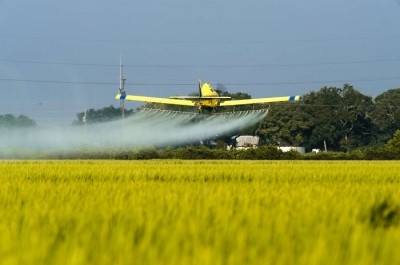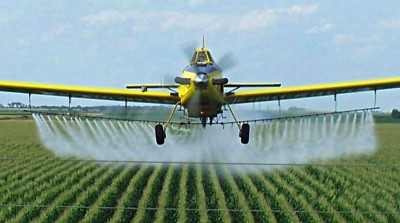Major New Report Confirms Your Worst Fears About Roundup, America’s Food
Monsanto’s Roundup, America’s most popular weed-killer, likely causes cancer. That’s the assessment of scientists at the World Health Organization’s (WHO) cancer research arm in a major new report.
Glyphosate – the active ingredient in Roundup – has been classified as “probably carcinogenic to humans” by experts at WHO’s International Agency for Research on Cancer (IARC) in France.
Researchers at the agency also found there is “limited evidence” that glyphosate can cause one form of cancer – non-Hodgkin lymphoma.
Glyphosate is now used in around 750 different herbicides and has been detected in air, food and water, IARC concluded in the British medical journal Lancet Oncology.
Could This All-Natural ‘Detox’ Capsule Have Extended John Wayne’s Life?
The report has huge implications. About 90 percent of the soybean crops and 70 percent of the corn crops in the United States are “Roundup Ready,” which means they’re genetically modified (GMO) to resist the spray.
Some groups applauded the report, saying it would help pressure the US government and other countries around the world to re-evaluate the safety of glyphosate and to require the labeling of GMO foods.
“The widespread adoption of GMO corn and soybeans has led to an explosion in the use of glyphosate – a main ingredient in Monsanto’s Roundup and Dow’s Enlist Duo,” Ken Cook, the president and co-founder of the Environmental Working Group, said in a press release. Glyphosate-based herbicides are designed to be used with Monsanto’s genetically modified Roundup Ready crops such as corn. “Consumers have the right to know how their food is grown and whether their food dollars are driving up the use of a probable carcinogen.”
The US Environmental Protection Agency considers Roundup safe and gave Monsanto permission for “increased tolerance levels” of glyphosate in 2013, Reuters reported.
Laboratory Tests Led To Report
IARC has four levels of carcinogen: known carcinogen, probably carcinogen, possibly carcinogen, and not classifiable and probably not carcinogenic. Roundup and glyphosate fall into the second category of concern.
The researchers based their conclusions on research on human exposure and on animal studies, the Working Group reported.
Without A Doubt The Best Kept Secret In Indoor Self-Reliance Gardening…
The chemical has been detected in the blood and urine of farm workers.
 “I don’t think home use is the issue,” IARC spokeswoman Kate Guyton told the Associated Press. “It’s agricultural use that will have the biggest impact.”
“I don’t think home use is the issue,” IARC spokeswoman Kate Guyton told the Associated Press. “It’s agricultural use that will have the biggest impact.”
Not surprisingly, Monsanto criticized the report.
“We don’t know how IARC could reach a conclusion that is such a dramatic departure from the conclusion reached by all regulatory agencies around the globe,” Paul Miller; Monsanto’s vice president of global regulatory affairs, said in a press release. “All labeled uses of glyphosate are safe for human health.”
As Off The Grid News reported last year, one study found glyphosate in human breast milk.
How To Protect Your Family
There are some steps you can take to make sure your family is not exposed to glyphosate. These include:
Glyphosate – the active ingredient in Roundup – has been classified as “probably carcinogenic to humans” by experts at WHO’s International Agency for Research on Cancer (IARC) in France.
Researchers at the agency also found there is “limited evidence” that glyphosate can cause one form of cancer – non-Hodgkin lymphoma.
Glyphosate is now used in around 750 different herbicides and has been detected in air, food and water, IARC concluded in the British medical journal Lancet Oncology.
Could This All-Natural ‘Detox’ Capsule Have Extended John Wayne’s Life?
The report has huge implications. About 90 percent of the soybean crops and 70 percent of the corn crops in the United States are “Roundup Ready,” which means they’re genetically modified (GMO) to resist the spray.
Some groups applauded the report, saying it would help pressure the US government and other countries around the world to re-evaluate the safety of glyphosate and to require the labeling of GMO foods.
“The widespread adoption of GMO corn and soybeans has led to an explosion in the use of glyphosate – a main ingredient in Monsanto’s Roundup and Dow’s Enlist Duo,” Ken Cook, the president and co-founder of the Environmental Working Group, said in a press release. Glyphosate-based herbicides are designed to be used with Monsanto’s genetically modified Roundup Ready crops such as corn. “Consumers have the right to know how their food is grown and whether their food dollars are driving up the use of a probable carcinogen.”
The US Environmental Protection Agency considers Roundup safe and gave Monsanto permission for “increased tolerance levels” of glyphosate in 2013, Reuters reported.
Laboratory Tests Led To Report
IARC has four levels of carcinogen: known carcinogen, probably carcinogen, possibly carcinogen, and not classifiable and probably not carcinogenic. Roundup and glyphosate fall into the second category of concern.
The researchers based their conclusions on research on human exposure and on animal studies, the Working Group reported.
Without A Doubt The Best Kept Secret In Indoor Self-Reliance Gardening…
The chemical has been detected in the blood and urine of farm workers.

Image source: croplife.com
Not surprisingly, Monsanto criticized the report.
“We don’t know how IARC could reach a conclusion that is such a dramatic departure from the conclusion reached by all regulatory agencies around the globe,” Paul Miller; Monsanto’s vice president of global regulatory affairs, said in a press release. “All labeled uses of glyphosate are safe for human health.”
As Off The Grid News reported last year, one study found glyphosate in human breast milk.
How To Protect Your Family
There are some steps you can take to make sure your family is not exposed to glyphosate. These include:
- Buy certified non-GMO foods or grow your own food in your garden. The Non-GMO Project certifies GMO foods and products and provides a list of such offerings on its website.
- Stay away from farms and other areas where herbicides are being sprayed.
- If spraying is taking place in your area, stay indoors and keep the windows closed.




No comments:
Post a Comment